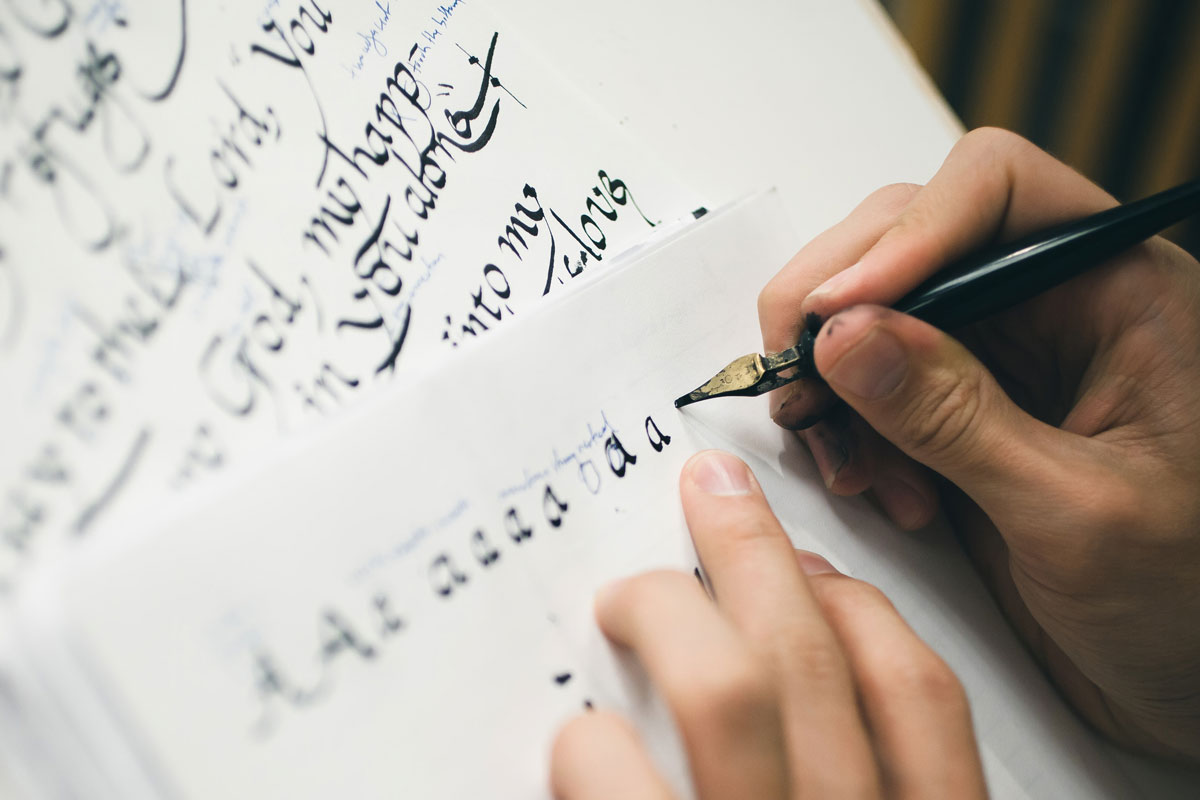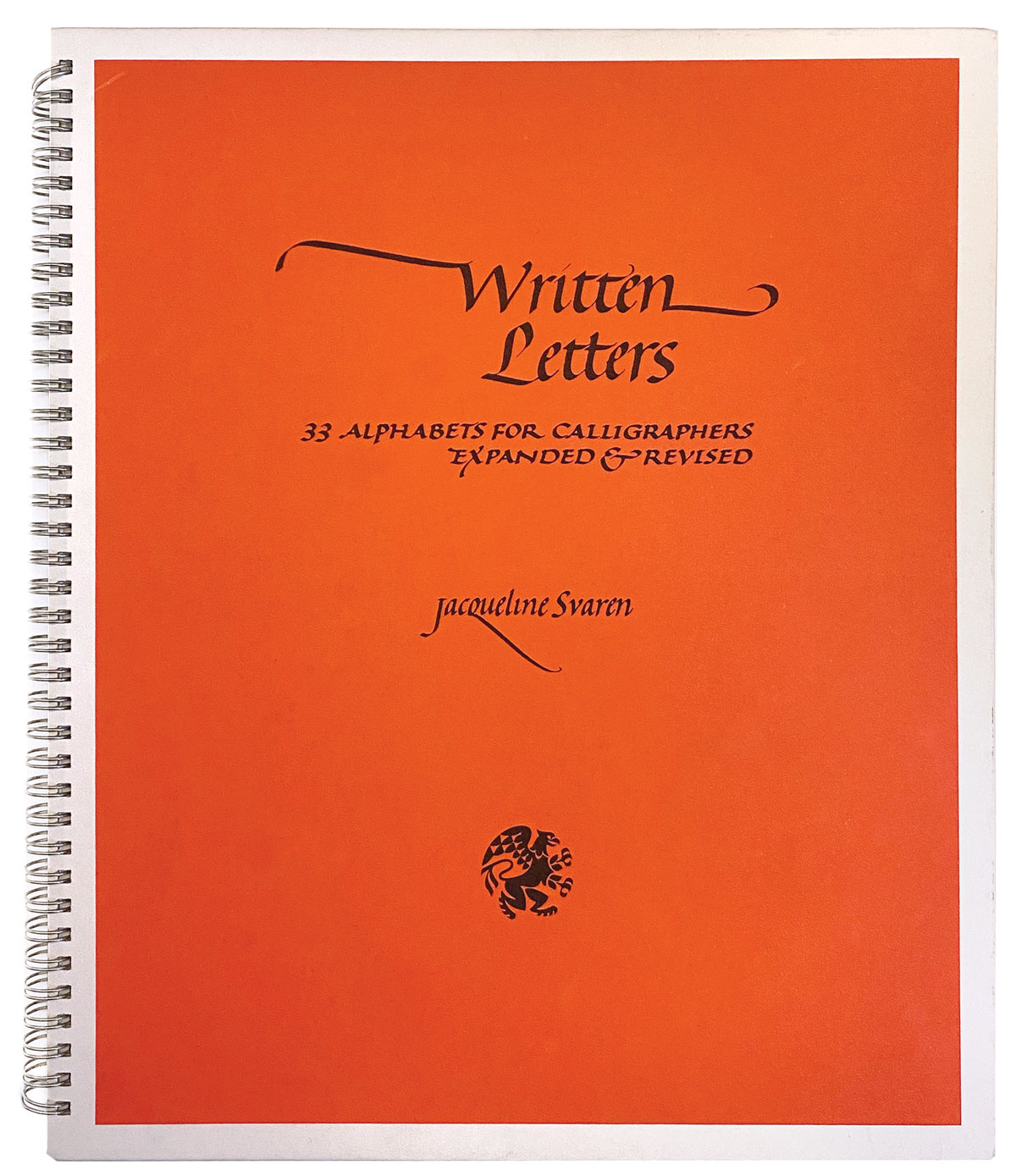Happy Birthday Scriptorium!
The Calligraphy Initiative celebrates 10 years of serifs and glyphs, metal nibs and oak gall ink, and the generous support of a small group of alumni and friends who made it possible.
Calligraphy, a transformative mind-body practice once taught at Reed by Prof. Lloyd Reynolds [art 1929–69], has been embraced by a new generation, thanks to the Calligraphy Initiative in Honor of Lloyd J. Reynolds, which celebrates its tenth anniversary this year.
The initiative is the creation of Stephanie Snyder ’91, director and curator of the Douglas F. Cooley Memorial Art Gallery, and Gregory MacNaughton ’89, the Cooley’s community engagement professional and the leader of the Calligraphy Initiative. The idea was sparked while they were working on an exhibition at the Cooley in conjunction with Reed’s Centennial: Lloyd Reynolds: A Life of Forms in Art, which Snyder curated with then-special collections librarian, Gay Walker ’69.
Understanding the rich heritage of calligraphy at Reed, Snyder and MacNaughton were inspired to revive the tradition, as were alumni who attended the exhibition and urged them forward. Stephanie and her spouse, Jonathan Snyder ’91, donated the funds to start the project, and several others joined them, allowing the Calligraphy Initiative to be established. Gregory MacNaughton ’89 worked with Reedies and community members who had studied with Reynolds to design the Scriptorium program for the Reed community, while furthering his own calligraphy education with Jaki Svaren ’50; MacNaughton met with Jaki each Monday for seven years, until her recent death in November 2021.
The history of calligraphy at Reed began in 1938, when students met informally at Reynolds’s home to study the italic hand along with Reynolds who was teaching himself. Then in 1948, Reynolds began offering calligraphy through his Graphic Arts Workshop. Beautiful, hand-lettered cards and flyers began to appear along hallway walls and bulletin boards. Dangling from tree branches were rain- and wind-battered weathergrams, slips of simple brown kraft paper calligraphed with short, often stunning poetry.
The practice of calligraphy and Reynolds’s classes deeply influenced students’ lives. “Calligraphy clicked with the Reed character—at least the way Reynolds taught it. [. . . ]His classes were never simply about the thing—they were about everything,” wrote Todd Schwartz in his profile of Reynolds in this magazine.
After Reynolds’s retirement, the calligraphy program at Reed continued under Robert Palladino, but in 1984 it was removed from the curriculum as an accredited course. As the years went on, sightings of weathergrams and such grew rarer and rarer.
“For many alumni of my generation, the discontinuation of calligraphy instruction at Reed was like an amputation of one of Reed College’s many limbs. And the reestablishment of calligraphy instruction was a kind of restoration that made Reed whole again,” says David Snyder ’65, who regularly shows up to Scriptorium via Zoom. “Okay, a bit of a hyperbole, I will admit,” he says. “But I want you to understand that the Calligraphy Initiative and Scriptorium are a big deal.”
What started out as a modest group of Reedies in 2012 has grown into an event called Scriptorium, with classes in italic, Chinese, and Arabic calligraphy three times a week. Students, alumni, faculty, and staff are invited to join; all materials are provided and no prior experience is necessary. The course is not for credit, but is rigorous and enjoyable. “Greg MacNaughton is a wonderful, dedicated calligraphy instructor,” Snyder says, “and I hear this all the time from people!” Guest instructors have included luminaries like Sumner Stone ’67 and Jaki Svaren ’50. Particularly notable, however, is the intergenerational community that the initiative has nurtured.
“I show up to Scriptorium twice a week. I chat with students, assuring them that they can get through their degrees, and I meet up with the same alums who attended while I was a student,” says Nikki Johnston ’19.
Prof. Jackie Dirks ’82 [history] notes that the classes “Give real meaning to the idea of Reed community.” She says, “This is a concrete example of the college contributing to the greater good: calligraphy classes are cross-generational, inclusive, and based on a long-standing commitment to making beautiful letters by hand,”
On the occasion of their gift, Stephanie and Jonathan wrote, “Over the last decade, we have witnessed the study of paleography and the practice of calligraphy transform students’ understanding of writing as an evolution of symbolic forms with multiple origins across the globe, almost all of them pictographic and spiritual in origin.”
In a statement that encapsulates the ineffable quality of practicing calligraphy, a weathergram hanging recently from a tree on the Great Lawn read, “I can’t tell you, but you feel it.”
Tags: Alumni, Books, Film, Music, Campus Life, Giving Back to Reed

